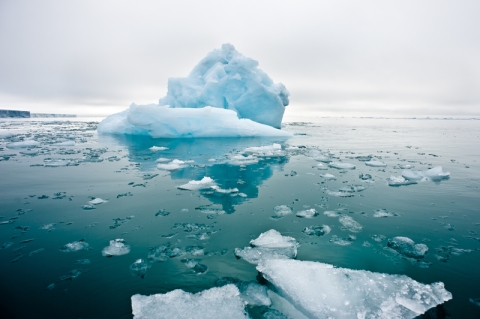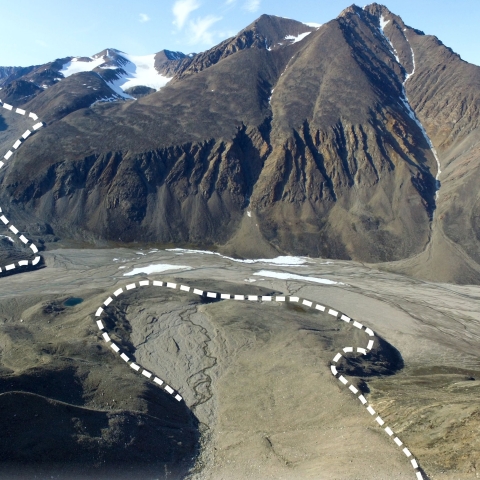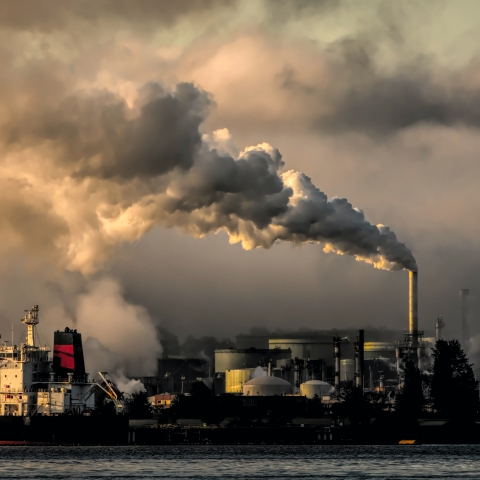

University of Portsmouth experts provide evidence to the UK’s environmental watchdog as part of new report calling for better focus of Arctic issues
12 October 2023
7
Rising sea levels, contributed to by Arctic ice melting, could put 1.5 million UK properties at risk from flooding, warns a new report by the UK environment watchdog.
Published today (12 October), the Environmental Audit Committee (EAC) document looks at growing evidence the Arctic is warming four times faster than the rest of the globe, suggesting changes in the polar region could make weather events in the UK more extreme.
However, the EAC says with much of the area under researched, more information is needed to examine what a changing Arctic climate could mean for our way of life. It urges the Government to move the Arctic up the political agenda, be more ambitious in reducing domestic emissions, and lead efforts to champion Arctic science globally.
The report highlights a number of key issues, including:
- The Arctic has less sea ice in every single month now compared to 40 years ago
- Ecosystems and habitats are being transformed and enormous disruption is being caused to the 4 million people who live in the Arctic
- In the UK, rising sea levels could risk up to 1.5 million properties flooding by 2080, with the Government likely having to choose which areas to protect with flood defences and management, and which can be allowed to flood
The University of Portsmouth was one of several institutions to contribute supporting evidence and insights to the EAC.
Being based in a coastal city such as Portsmouth, we are also acutely aware of the current and future impacts that Arctic changes have on the UK, not least the increased risk of coastal flooding.
Dr Harold Lovell, University’s School of Environment, Geography and Geosciences
Dr Harold Lovell, a glaciologist from the University’s School of Environment, Geography and Geosciences, said: “We have a long history of researching the Arctic within the School. We particularly focus on the changing climate, glaciers, ecology, and wildfire activity, and the impact this has on the people that live there.
“Being based in a coastal city such as Portsmouth, we are also acutely aware of the current and future impacts that Arctic changes have on the UK, not least the increased risk of coastal flooding.
“We are glad to contribute our knowledge to today’s report alongside other colleagues in the UK and look forward to renewed and coordinated Arctic research efforts.”
There remain significant gaps in knowledge from Arctic science and research. The UK produces 10 per cent of the world’s Arctic research papers, but there is the opportunity to do more: from examining the under-researched polar winter to having a stronger operational presence in the Arctic throughout the year.
At present, grants are usually offered for short-term studies, despite the need for long-term data highlighting the changes that are occurring in slower time. Strategic, long-term funding should be secured to support scientific monitoring over periods of at least 10 years, and a dedicated institute should coordinate Arctic research undertaken by UK universities.
Meanwhile, access to the Arctic can be treacherous, but the UK’s new ice-strengthened polar research ship, RRS Sir David Attenborough, has the ability to offer research and logistical support while enabling research to predict extreme weather.
To demonstrate the UK’s commitment to its responsibilities in the Arctic, the EAC says the RRS Sir David Attenborough should voyage to the North Pole.
Given that she predominantly operates in the Antarctic, the watchdog also recommends the Government consider providing an additional ship for UK scientists and researchers in the Arctic. Other UK ships operating in the region are not ice-strengthened.
Aside from science and research, retreating ice and availability of Arctic resources is leading to competition between the West, Russia and China which is heightening geographical tensions.
Following Russia’s ‘freezing out’ of Arctic Council activity, it has been working with China in the Russian Arctic on oil and gas extraction.
The Committee is concerned that the competition for resources and increased military presence by both Russia and NATO in the Arctic is diverting attention away from climate change in the region. Since the Ukraine invasion, 130 research projects have been paused.
Environmental Audit Sub-Committee on Polar Research Chair, James Gray MP, said: “For too long the effects of a changing Arctic have been ‘out of sight, out of mind’. Before melting glaciers and ice sheets contribute to widespread flooding and irreversible weather patterns in the UK, we must throw our full toolbox at understanding changes in the Arctic better.
“Russia has been frozen out of Western Arctic science following its invasion of Ukraine. The Arctic Council, built with the purpose of boosting collaboration with Arctic nations, is becoming less influential and much of its important work has stalled. Our loss of access to Russian data is concerning, and 50 per cent of the Arctic is now inaccessible to Western scientists. We must look into alternative international fora to champion and collaborate on Arctic research.
“Whitehall has not been paying enough attention to the Arctic. Four Ministers jotted around different departments with no oversight on Arctic policy is a missed opportunity. The fact the Ministers are yet to meet indicates a lack of enthusiasm on Arctic matters at the heart of Government: they must meet quarterly given the drastic changes we are witnessing in our changing Arctic. The Government should now appoint a polar envoy.”
Moving forward, the paper calls for the Government to prioritise and put more funding behind scientific and multi-disciplinary research and more collaboration with UK universities to avoid repetition of scientific endeavours seeking out the same information.
More like this...
Greenland glaciers and ice caps now melting at three times the rate over last century
25 May 2023
8

How to prepare our oceans for one of climate change’s silent killers
28 March 2023
3 min read

Funding awarded for project to lessen global warming impact of aeroplane contrails
18 August 2022
5 min read

